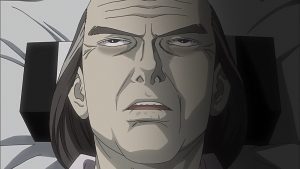 It’s hard to believe this odyssey is almost over, but after almost a decade I’m a single episode away from the end of Hyouge Mono at last. I haven’t been in a hurry to finish these final two episodes if I’m honest. In addition to the usual melancholy over finishing a great series, having this one as an ongoing part of my anime life has been a companion for so long that I hate to let that go. When you’re following an ongoing series, you finish it when it finishes – the decision is taken out of your hands. With something from the past like this, all the emotions can tug at you with full force.
It’s hard to believe this odyssey is almost over, but after almost a decade I’m a single episode away from the end of Hyouge Mono at last. I haven’t been in a hurry to finish these final two episodes if I’m honest. In addition to the usual melancholy over finishing a great series, having this one as an ongoing part of my anime life has been a companion for so long that I hate to let that go. When you’re following an ongoing series, you finish it when it finishes – the decision is taken out of your hands. With something from the past like this, all the emotions can tug at you with full force.
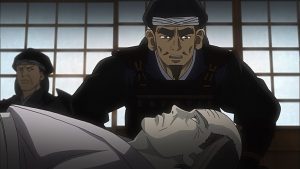 This episode opens with a bombshell: Tokugawa Ieyasu knew of Hideyoshi’s involvement in the Honnou-ji incident all along – because he actually spoke with Akechi before he died. That certainly casts his interactions with Hideyoshi in a very different light. It paints Tokugawa as an extremely practical and cautious man – a quality that Sen no Rikyu, to be certain, saw in him. But even as he refused Rikyu’s advances the master’s words ring in his ear – “You cannot make your ideals come true without dirtying your own hands”.
This episode opens with a bombshell: Tokugawa Ieyasu knew of Hideyoshi’s involvement in the Honnou-ji incident all along – because he actually spoke with Akechi before he died. That certainly casts his interactions with Hideyoshi in a very different light. It paints Tokugawa as an extremely practical and cautious man – a quality that Sen no Rikyu, to be certain, saw in him. But even as he refused Rikyu’s advances the master’s words ring in his ear – “You cannot make your ideals come true without dirtying your own hands”.
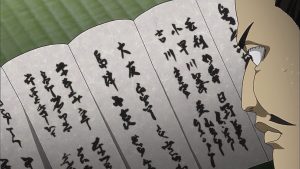 Even if things didn’t actually happen this way, it makes one hell of a poetic story. With Rikyu’s arrest and inevitable execution, Tokugawa can no longer sit back and let others be bold as he bides his time. The decision he takes here is a momentous one – in his own words “to become a traitor for my ideals”. Even so, he becomes a traitor only in secret – sending a pair of assassins to Kyoto to make sure the Chief Advisor dies even if Lady Ogin is unable to finish the job herself.
Even if things didn’t actually happen this way, it makes one hell of a poetic story. With Rikyu’s arrest and inevitable execution, Tokugawa can no longer sit back and let others be bold as he bides his time. The decision he takes here is a momentous one – in his own words “to become a traitor for my ideals”. Even so, he becomes a traitor only in secret – sending a pair of assassins to Kyoto to make sure the Chief Advisor dies even if Lady Ogin is unable to finish the job herself.
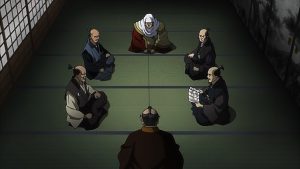 In the capital, things are moving quickly. Rikyu is placed under house arrest, and pens a coded poem to his daughter to instruct her to terminate the plan, no longer wishing anyone else to be involved. But the love and loyalty Rikyu has cultivated over the decades is a beast beyond his means to control. Ogin proceeds with the plan anyway, and the young Hosokawa Tadaoki ignores his father’s advice and rushes to see Rikyu off, even knowing it will place his own life and the survival of his clan in doubt. Sasuke is sent to stop him and fails, and both see the barge carrying Rikyu as is eases down the Yodogawa. Tadaoki uncovers his face, Sasuke does not – but Rikyu knows, just the same.
In the capital, things are moving quickly. Rikyu is placed under house arrest, and pens a coded poem to his daughter to instruct her to terminate the plan, no longer wishing anyone else to be involved. But the love and loyalty Rikyu has cultivated over the decades is a beast beyond his means to control. Ogin proceeds with the plan anyway, and the young Hosokawa Tadaoki ignores his father’s advice and rushes to see Rikyu off, even knowing it will place his own life and the survival of his clan in doubt. Sasuke is sent to stop him and fails, and both see the barge carrying Rikyu as is eases down the Yodogawa. Tadaoki uncovers his face, Sasuke does not – but Rikyu knows, just the same.
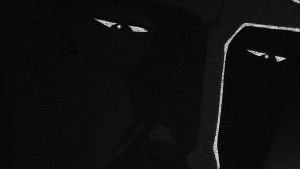 The actions of Rikyu’s closest disciples are the key to everything here, as the other powerful daimyou wait anxiously to see whether they’ll strike the first blow. Hideyoshi, for his part, continues to dither even as Ishida tries to manoeuver him into a decision. It’s obvious that Hideyoshi is desperate not to execute Rikyu, and not for political reasons. But Rikyu has no wish to be spared – he even rejects a pardon contingent only on his apology. Ogin’s ultimately failed attempt on his life, along with that of Tokugawa’s two assassins (which Ishida blames on Rikyu) finally force his hand. Even then he defies Ishida and orders that Rikyu commit seppuku like a warrior rather than be beheaded like a criminal.
The actions of Rikyu’s closest disciples are the key to everything here, as the other powerful daimyou wait anxiously to see whether they’ll strike the first blow. Hideyoshi, for his part, continues to dither even as Ishida tries to manoeuver him into a decision. It’s obvious that Hideyoshi is desperate not to execute Rikyu, and not for political reasons. But Rikyu has no wish to be spared – he even rejects a pardon contingent only on his apology. Ogin’s ultimately failed attempt on his life, along with that of Tokugawa’s two assassins (which Ishida blames on Rikyu) finally force his hand. Even then he defies Ishida and orders that Rikyu commit seppuku like a warrior rather than be beheaded like a criminal.
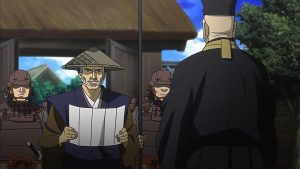 Even here, after all we’ve seen, Hideyoshi comes off more as a tragic figure than anything else. Everyone around him is either using him or betraying him (even Ochacha, who values his life only as a means of allowing their son to grow old enough to succeed him). For all his scheming, for all the power he’s acquired, Hideyoshi feels utterly alone and unhappy. His story is like that of no one else in Japanese history – a scratched and clawed journey from the bottom of society to the pinnacle of power. Yet it never brought him happiness, or even the acceptance he so desperately longs for.
Even here, after all we’ve seen, Hideyoshi comes off more as a tragic figure than anything else. Everyone around him is either using him or betraying him (even Ochacha, who values his life only as a means of allowing their son to grow old enough to succeed him). For all his scheming, for all the power he’s acquired, Hideyoshi feels utterly alone and unhappy. His story is like that of no one else in Japanese history – a scratched and clawed journey from the bottom of society to the pinnacle of power. Yet it never brought him happiness, or even the acceptance he so desperately longs for.
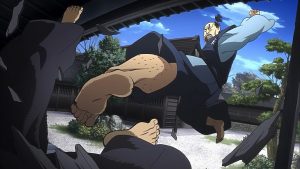 Rikyu, by contrast, has a legion of men (and women, especially his poor wife) who love him, and it’s their actions that will determine what happens after his death. To act in retribution is to be a traitor, a rebel, to risk annihilation not just of themselves but their families and clans. What will Sasuke, that iconoclast on whom the armor of a warrior never seemed to fit, decide to do now? Rikyu’s main concern is not who will reign after his death, but what will happen to his aesthetic. To be a warrior or an aesthete – to turn the other cheek and do nothing as his beloved master dies in order to preserve his legacy, or to throw everything away and fight? This is the question at the center of the entire series, and the one Sasuke can no longer avoid here at the end of all things.
Rikyu, by contrast, has a legion of men (and women, especially his poor wife) who love him, and it’s their actions that will determine what happens after his death. To act in retribution is to be a traitor, a rebel, to risk annihilation not just of themselves but their families and clans. What will Sasuke, that iconoclast on whom the armor of a warrior never seemed to fit, decide to do now? Rikyu’s main concern is not who will reign after his death, but what will happen to his aesthetic. To be a warrior or an aesthete – to turn the other cheek and do nothing as his beloved master dies in order to preserve his legacy, or to throw everything away and fight? This is the question at the center of the entire series, and the one Sasuke can no longer avoid here at the end of all things.


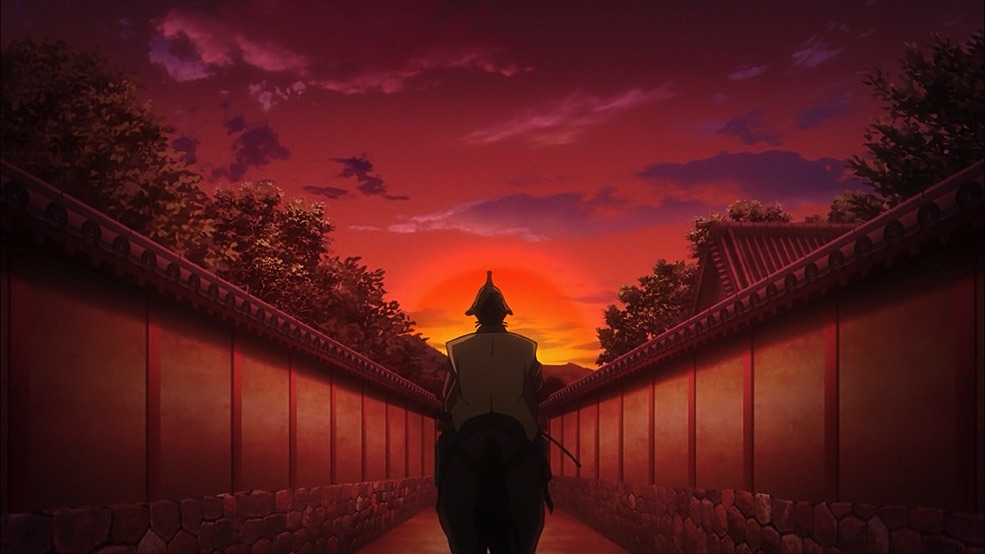
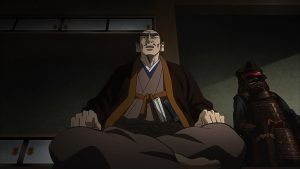
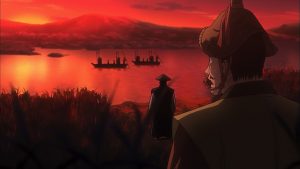
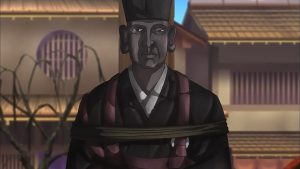
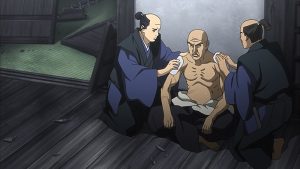
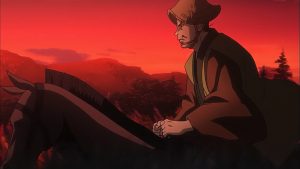
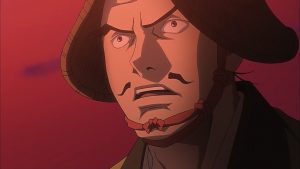
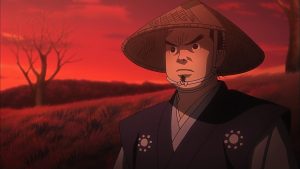
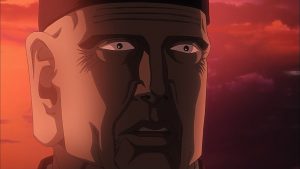
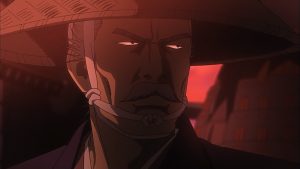
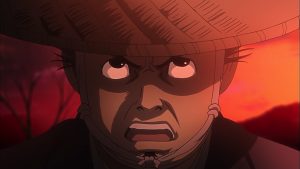
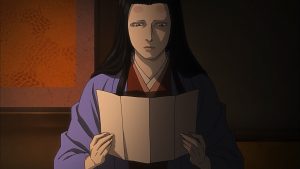
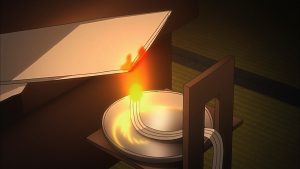
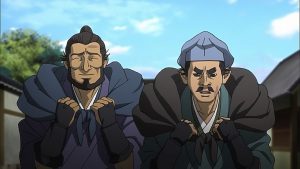
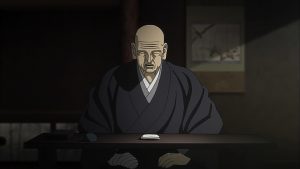
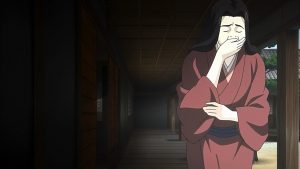
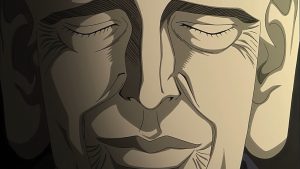
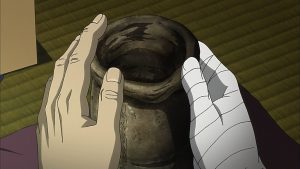
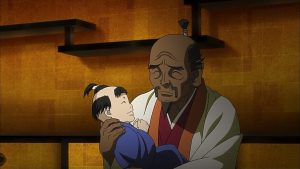
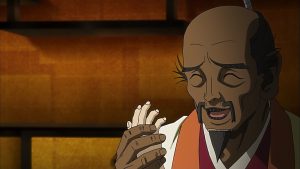
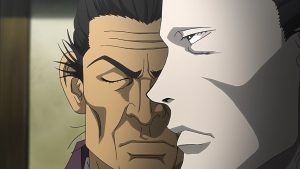
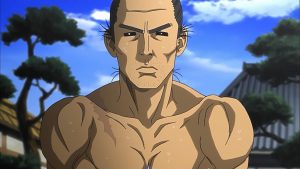
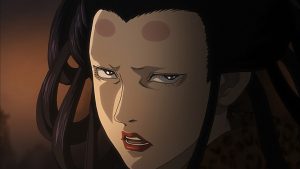
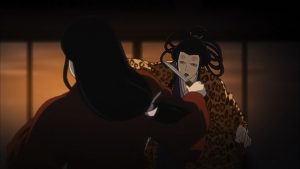
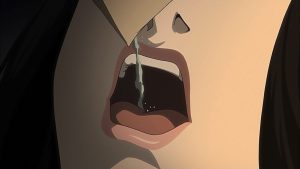
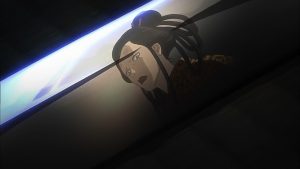
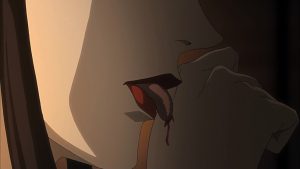
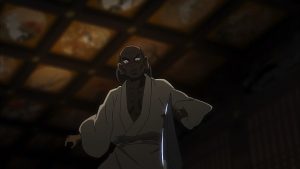
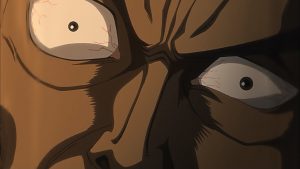
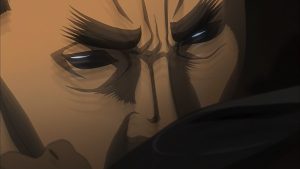
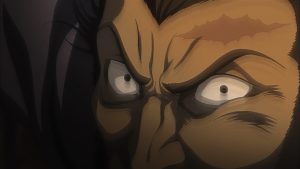
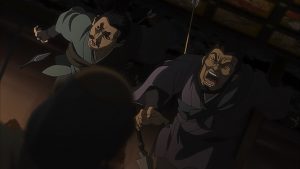
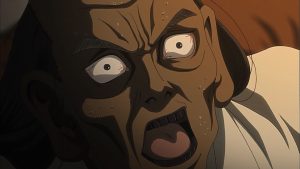
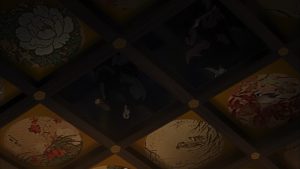
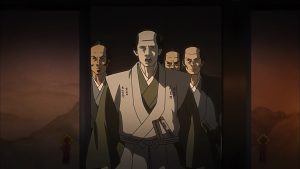
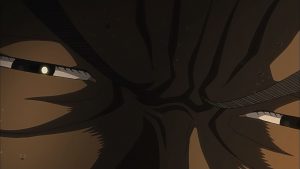
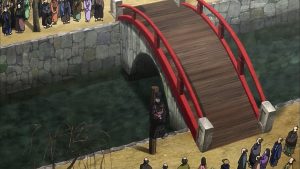
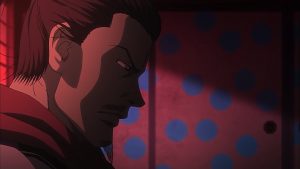
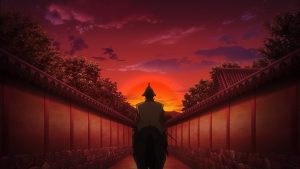
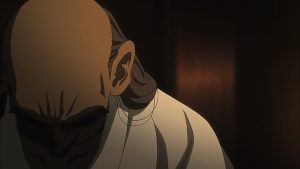
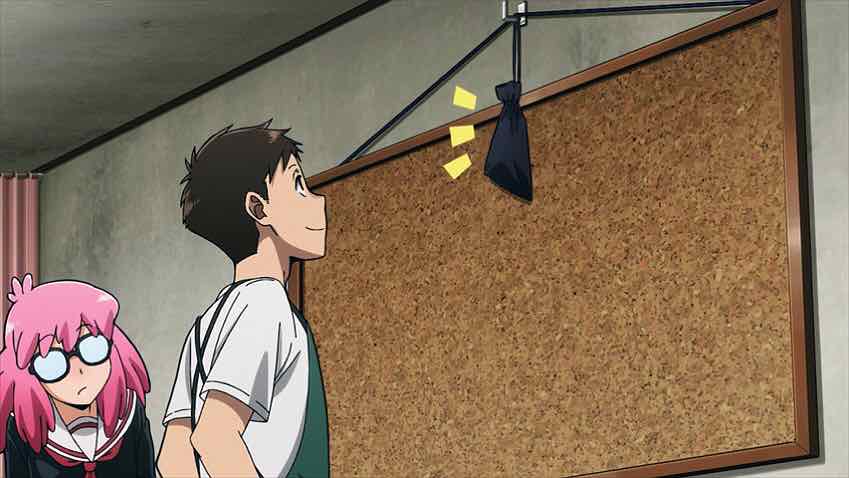
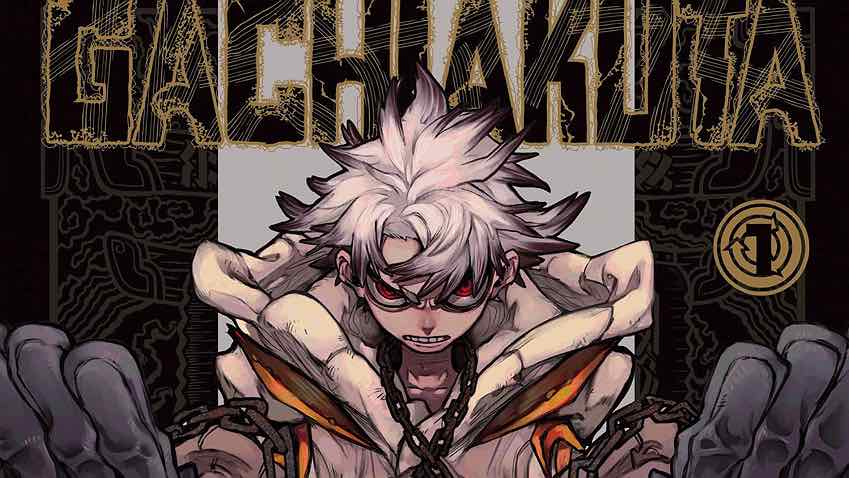
Derrick
February 28, 2021 at 10:34 am“Why does nobody love me?”
When Hideyoshi asked that after Ogin’s attempt, I can only feel that history is just full of lonely people.
Guardian Enzo
February 28, 2021 at 11:23 amIndeed, and that probably explains why a lot of historical events happened.